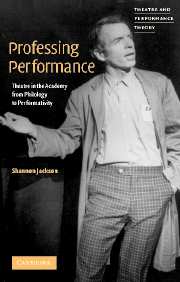Book contents
- Frontmatter
- Contents
- Acknowledgments
- 1 Discipline and performance: genealogy and discontinuity
- 2 Institutions and performance: professing performance in the early twentieth century
- 3 Culture and performance: structures of dramatic feeling
- 4 Practice and performance: modernist paradoxes and literalist legacies
- 5 History and performance: blurred genres and the particularizing of the past
- 6 Identity and performance: racial performativity and anti-racist theatre
- Notes
- Select bibliography
- Index
1 - Discipline and performance: genealogy and discontinuity
Published online by Cambridge University Press: 30 March 2010
- Frontmatter
- Contents
- Acknowledgments
- 1 Discipline and performance: genealogy and discontinuity
- 2 Institutions and performance: professing performance in the early twentieth century
- 3 Culture and performance: structures of dramatic feeling
- 4 Practice and performance: modernist paradoxes and literalist legacies
- 5 History and performance: blurred genres and the particularizing of the past
- 6 Identity and performance: racial performativity and anti-racist theatre
- Notes
- Select bibliography
- Index
Summary
“Differentiation is one strategy that disciplines employ to protect themselves against incursion and self-doubt. But how about the opposite strategy: emulation, imitation, envy?”
Marjorie Garber“It is not easy to say something new.”
Michel FoucaultComing to terms
“Isn't ‘performativity’ the latest thing in ‘English’ theory?”
It was one of those over-determined moments in the life of a theatre academic. I had been asked as a faculty member in an English department to participate on a panel responding to a production of the American Repertory Theatre. The question came from a dramaturg – the in-house academic of the theatre profession – as we ate dinner before the ART's subscriber event. The director of the production also sat at the table, looking slightly amused.
“Yes, it's actually pretty trendy,” I said, picking up my fork and being fairly certain that neither of them really wanted to hear about the trends.
“Perform-a-tivity,” repeated the director, and then once again, “per-form-a-tiv-ity. That's what they call it?”
“Yeah,” said the dramaturg, “I hear it alot.”
“So maybe I should start using that,” the director was laughing, “No, I'm sorry; I'm not a director. I'm a Performativity Coordinator.”
We all laughed. I took another bite of food, hoping that the conversation was finished.
“So what do … what does … they mean … that mean?” the two asked one on top of each other.
I continued chewing. I swallowed.
“Well,” I began, dreading what would follow, “the concept of ‘performativity’ within literary studies is a reworking of the ideas of this guy, J.L. Austin …”
- Type
- Chapter
- Information
- Professing PerformanceTheatre in the Academy from Philology to Performativity, pp. 1 - 39Publisher: Cambridge University PressPrint publication year: 2004

